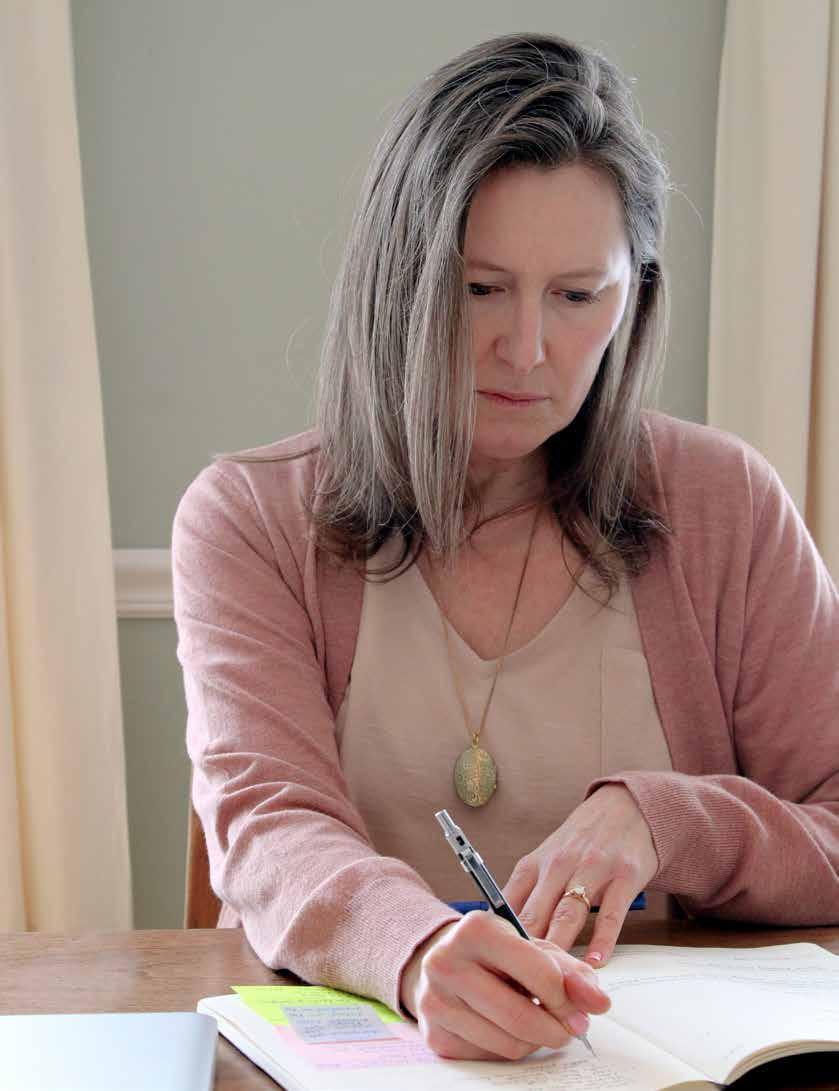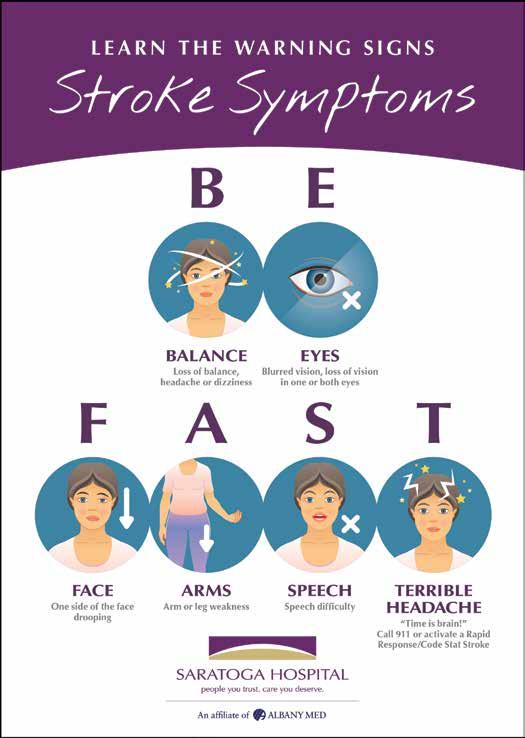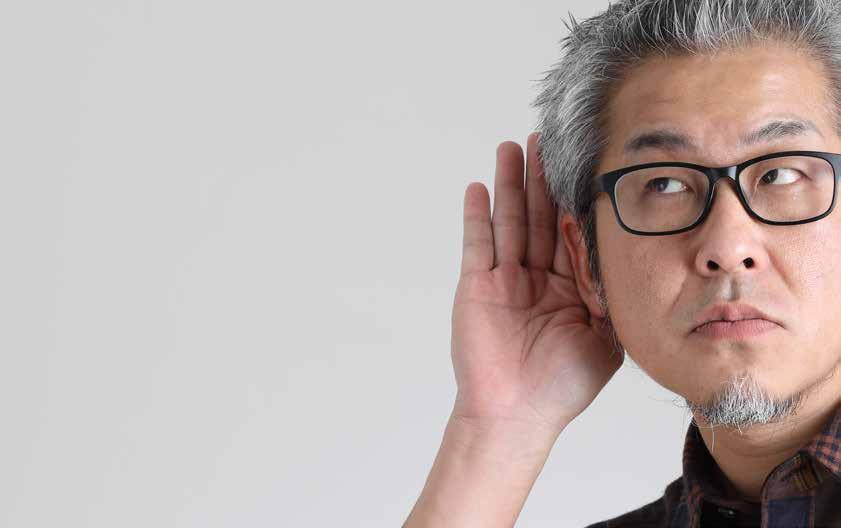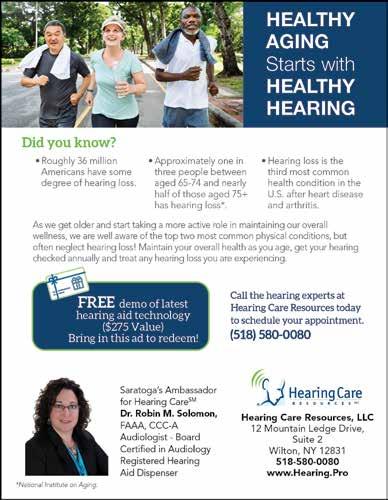
9 minute read
Hearing Loss Affecting You?
DNA doesn’t lie, but you have to figure out what it is telling you.”
- CeCe Moore
I meet with Tobi Kirschmann, forensic scientist, and owner of DNA Investigations, right here in Saratoga, over coffee and pastry at Mrs. London’s. It’s an early Sunday morning, and I find myself excited to speak with her, learn more about what she does. I mean, who isn’t interested in solving mysteries through the use of DNA? First off, the woman sitting in front of me is charming and warm. I instantly feel at ease speaking with her. She tells me a little bit of her background; she received her first degree at Berkely- in Woman Studies. She worked in the California Department of Justice DNA Databank, located in Richmond, CA, from 2007-2017, and helped in the 40-year investigation of The Golden State Killer. Police arrested Joseph James DeAngelo, the serial rapist, burglar, former police officer, and serial killer, in 2018, through the help of DNA. Tobi helped establish the Deceased Inmate DNA Database (D3) Program and was the lead Criminalist once it was up and running. She also worked for a year and a half at the NYSP Forensic Investigation Center, located in Albany. While there, Tobi was employed as a Forensic Scientist III in their Databank before opening her own business in October 2020. “I will continue to work the law enforcement side of my business,” she states, “but I’m excited to use all of those talents – digging into DNA aspects to track and nail down answers people might have on the family history side of things as well.” That’s what we’re here to talk about today.
Everyone around the globe seems to be interested in their family roots.
DNA databases like Ancestry, My Heritage, Living DNA, FindMyPast, and 23andMe are only a handful of tests people can avail themselves of these days. “And sometimes, those results can unearth surprises,” Tobi tells me. You can say that again. When my mom died, we learned that – not only was she German; she was Jewish as well. My sisters and I never knew this – and our dad wasn’t willing to help us fill in the blanks. Left with a gazillion questions, we’re hoping DNA testing will help us get answers. “So, it all starts with a question, and everyone’s journey is personal,” the woman across from me says. “Sometimes, those questions are painful. Imagine learning you have a half-sister or brother. That means you have a parent out there – someone you know nothing about. Or maybe you discover you’re adopted. There are so many things that can happen after receiving DNA results you weren’t expecting.” That’s where Tobi comes in, offering a free consultation, helping to formulate a structured plan for her clients to solve a family mystery. “Some cases are resolved quickly, while others are ongoing and might take months. It’s my job to listen. What is it they need? As a team, my client and I figure out what will bring closure. I am there for them every step of the way.” At the moment, Tobi is working on two separate DNA cases, both with adoptees. One will be solved quickly, while the other is “One of the most difficult to date.” Besides that, she teaches ALL (Academy Lifelong Learning) at Suny Empire. Tobi states she’s beginning to master Zoom classes with her students – a necessity we’re all dealing with due to the pandemic. “They’re all so smart and inquisitive,” she laughs a little. “If I’m trying to figure out how to sharescreen more than one thing, there’s always someone attending who can help me figure the technical stuff out.” I ask about her family. Tobi is married to a New York native, Michael, and the couple has a six-year-old daughter, Katie, and a 16-year-old son, named Shane. They all believe in her and what she’s trying to do with DNA Investigations. “When I left to come to meet you today, Shane called out – ‘good luck with your interview today!’ We chuckle over that – kids can be such champions. When Tobi reviews the investigative packages she offers to clients (should they choose to move ahead with their questions), I’m impressed. EXPLORE: Comes with five hours of research and is a good starting point for larger projects. EXAMINE: Tobi provides 20 hours of research and suggests this package for someone with an unknown parent. DISCOVER: This is the most extensive offering, including 30 hours of research and both hard copy and electronic results. “I feel very strongly about calls from the past. Whether it’s a series of questions concerning victims of crime or someone searching for answers to their family history,” Tobi tells me with a contemplative gleam in her eye. “We all need to have those questions answered – and they can be, through DNA.” SF

your ears & your brain:
A Dynamic Duo

WRITTEN BY ROBIN M. SOLOMON, AU.D
When you think of great partnerships, what comes to mind? Abbott and Costello? Sonny and Cher? Batman and Robin?
How about your brain and your ears? Surprising, perhaps, but true. Our ears simply pick-up sounds and pass them to their partner -- the brain. The brain then makes sense of sounds and turns them into meaning. When the brain receives less information than it needs to process the sound scene you are in, it must work harder to turn that sound into meaning. The brain must fill in the gaps and try to guess what is being said. The harder the brain works to hear, the more tired we become and the more tempting it may be to withdraw from social activities. This, in turn, can lead to isolation, depression and a feeling of exclusion from the world around us. While their functions are distinctly different, your hearing health depends on how well your brain and your ears work together as partners. Your brain relies on both of your ears to collect sound, interpreting the incoming data to decide what to focus on. That information helps the brain decide what is important for understanding speech. The brain then focuses on that specific source -- perhaps the person speaking to you -- while ignoring background noise. Your brain and ears also work together to fight debilitating medical issues. Because we hear with our brains, untreated hearing loss can lead to cognitive difficulties, increasing the risk for developing dementia and Alzheimer’s. When the brain “forgets” what it’s like to hear, it is difficult to regain those pathways. Not hearing well can lead to social isolation, loss of income or earning potential, depression, anxiety, and anger. Untreated hearing loss may also be an underlying symptom for larger health problems, such as cardiovascular disease or diabetes.
FOR HEALTHY HEARING EARS, IT IS IMPORTANT TO MANAGE YOUR ABCS
• A1c: A simple blood test that measures your average blood sugar levels. Diabetes may contribute to hearing loss by damaging nerves and blood vessels. • Blood pressure: High blood pressure seems to accelerate age-related hearing loss by restricting blood flow to the inner ear and to the regions of the brain involved with hearing. • Cholesterol: Maintain healthy LDL/HDL levels to keep your blood vessels clear. Heart disease has been tied by studies to hearing loss.
THERE ARE OTHER STEPS YOU CAN TAKE TO KEEP YOU HEARING HEALTHY:
• Turn down the volume: Protect your ears from excessive noise with headphones or disposable earplugs if you engage in a noisy occupation, hobbies or know you’ll be attending an event where noise levels will be excessive.
• Don’t smoke.
Mask-wearing can exacerbate hearing difficulties.
Pandemic safety measures can make it harder to communicate. Indeed, many of the CDC recommendations for preventing the spread of the Coronavirus are creating communication problems for the 48 million Americans -- approximately 20 percent of the population-- who are living with hearing loss. Here are three obvious examples: • Muffled Speech: Face masks help to slow the spread of the virus from person to person. Yes, masks also create muffled speech, making words more difficult to understand. • Hearing at a distance: Responsible social distancing suggests that you should maintain six feet or more between yourself and others to minimize transmission of the virus. Unfortunately, the further you are from someone, the more difficult it is to hear them. Research by the Acoustical Society of America also suggests that moving farther away decreases a person’s attention span for focusing on understanding speech. • Visual Cues: Another unintended consequence of face masks and social distancing is the elimination of visual cues like facial expressions, body language, and lip reading, which are vital for the human brain to process and understand speech. Whether you are participating in a virtual meeting (i.e. Zoom, Skype, FaceTime, etc.) or are in-person but behind a face covering, it is more difficult to connect with and understand others. If you have a hearing loss (whether diagnosed or not), you are probably both exhausted and increasingly frustrated when trying to communicate while abiding by the recommended guidelines to keep yourself and others safe and healthy. The good news is that we understand your challenges and have solutions to help you, during this time of wearing masks and beyond.

In addition, to keep your brain healthy, medical professionals recommend getting good sleep, regular physical exercise, and engaging in mind-challenging activities, such as crossword puzzles. To keep your hearing healthy, hearing healthcare professionals recommend having a baseline hearing test at age 50 — or sooner if you suspect you have hearing loss — and to address any hearing loss diagnosis immediately. Scientists have been studying the relationship between hearing and the brain for decades. Their findings are used by hearing instrument manufacturers to improve hearing solutions and by audiologists to evaluate and treat patients. Thankfully, the majority of age-related hearing loss can be treated with hearing instruments. While hearing aids do not restore normal hearing, hearing aid users report greater satisfaction with their daily lives. Your brain and hearing are a dynamic duo that work together not only to help you hear, but to maintain your overall health. Anyone with concerns about their hearing should discuss it with their audiologist who can help you keep your ears and brain working in tandem. Contact audiologist Dr. Robin Solomon, Doctor of Audiology at Hearing Care Resources, to learn more about our assistive technology options and effective strategies for boosting communication. With so many things out of your control at this time, you can still choose communication strategies that will improve your quality of life to keep your ears and brain working together in partnership. Call 518-580-0080 or visit us at www.Hearing.Pro! SF
SIGN UP ONLINE TODAY!
saratogaTODAYnewspaper.com | 518-581-2480












